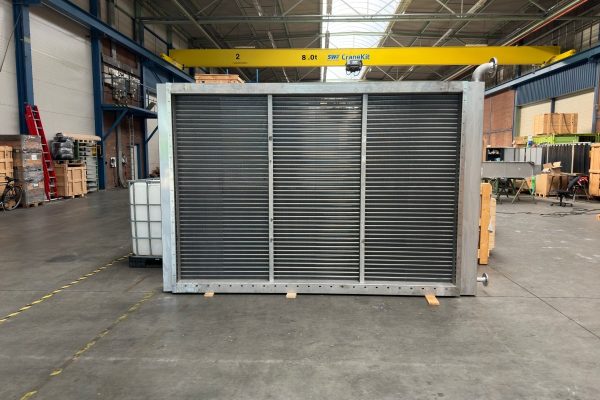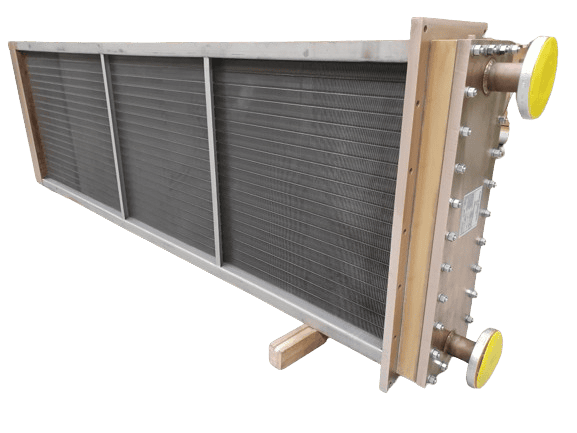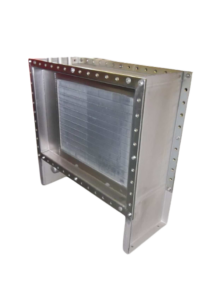LEADING INNOVATION IN THERMAL TRANSFER
INDUSTRIAL HEAT EXCHANGERS

Elevating global standards with exceptional, unmatched Dutch craftsmanship in advanced industrial heat exchange.
INDUSTRIAL HEAT EXCHANGERS
DEFINITIONS
Elevating energy efficiency in manufacturing
At ICARUS Heat Exchangers, we understand the pivotal role energy efficiency plays in modern manufacturing. We recognize that in an era where sustainability and optimization are paramount, industrial heat exchangers are not just components of the process; they are the cornerstone of manufacturing’s future. This article delves into the heart of our work at ICARUS. Here, we’ll explore the transformative role of industrial heat exchangers in enhancing energy efficiency and paint a picture of what this means for the future of manufacturing. As you navigate these lines, we hope to offer valuable insights into how our heat exchange solutions are fuelling the revolution in manufacturing and propelling industries towards a sustainable, energy-efficient future.


Dutch excellence in heat exchange
At ICARUS Heat Exchangers, we blend Dutch craftsmanship with innovative technology, redefining the gold standard for industrial heat exchangers. Dive into the future of sustainable manufacturing, where our Dutch-engineered solutions elevate energy efficiency to unparalleled heights.
Lower total cost of ownership (TCO)
We go beyond performance with our heat exchangers, sculpting an unbeatable blend of.
Direct manufacturer benefits
Your unique needs are our command. We offer tailored heat exchanger solutions.
Customized solutions
With ICARUS Industrial, you're not just buying a product, you're engaging a partnership. Our direct sales model
Superior durability
Built from robust materials, our heat exchangers are a testament to resilience. They reduce maintenance

Types of heat exchangers
Heat exchangers, fundamental to countless industrial processes, come in a multitude of forms, sizes, and designs, each purpose-built to fulfill specific roles within the context of their applications. A deep understanding of the common types and their specific applications is paramount in tailoring industry solutions.
Among the frequently employed heat exchangers are finned tube heat exchangers and shell-and-tube heat exchangers. While the plate heat exchanger, with its parallel-running hot and cold fluids separated by evenly-spaced metal plates, serves various industrial needs, it’s the finned tube heat exchangers that truly stand out.

Specific designs
We also see specific designs like frame heat exchangers and plate-type heat exchangers. The choice of size of a heat exchanger is crucial as it impacts the rate of heat exchange and the space it requires within an operation.
Oil coolers and charge air coolers are other examples of specialized heat exchangers. Companies manufacture these to cater to the specific requirements of industries such as power plants and chemical processing facilities. In these settings, waste heat recovery units are often employed, maximizing the use of heat produced.


Heat transfer coefficient
The heat transfer coefficient, an essential factor, influences the performance of direct contact heat exchangers and fluid heat exchangers. These heat exchangers work under different pressure conditions, with some designed as low-pressure heat exchangers, while others handle high-pressure environments.
A compact heat exchanger
Microchannel heat exchangers, known for their compact size and high efficiency, are often used where space is at a premium. They have applications in areas with high metabolic heat production, requiring efficient heat management. Other variations include the Air Radiators Plate Heat Exchangers and the aluminum plate heat exchanger, recognized for their specific benefits in respective applications.
Looking at more specific applications, steam plants often employ a type of surface heat exchanger to condense the super-heated vapor produced in the process. In contrast, oxygen liquefaction plants may use specialized plate heat exchangers to condense the distillate vapors produced during the process.
From tube-based heat exchangers to the plate heat exchanger power variants, the diversity and specificity of heat exchanger designs reflect the broad scope of their applicability, signifying their vital role in the world of industrial processes.

Download a sample DWG
Discover precision engineering: Download a sample DWG of our top-notch heat exchangers.
FAQ
What are industrial heat exchangers?
Industrial heat exchangers are innovative pieces of heat transfer equipment that play a vital role in facilitating efficient heat transfer from one medium – often a hot fluid – to another, such as cold water. These devices, which come in various forms, including regenerative heat exchangers, heat pipes, and coolers, are indispensable in a wide array of industrial processes.
Applications for these versatile tools span across numerous sectors, including but not limited to, fossil-fueled and nuclear power plants, chemical plants, and air separation plants. Even the beverage and dairy industries benefit from their functionality. Heat exchangers not only control the temperature profiles of the processed materials but can also contribute to changes in their chemical composition, depending on the specific requirements of the process.
What are the key design considerations and variations in heat exchangers for different applications, and how do they optimize heat transfer efficiency?
The construction of heat exchangers, such as those provided by us and other leading manufacturers, is nuanced and reflects the specific application each serves. For instance, in air heat exchangers, the size and fin configuration aim to optimize the transfer of heat, while double-pipe heat exchangers feature baffles to control the heat stream.
Considering the heat source, fluid temperatures, and desired heat transfer effectiveness, the design may feature elements such as variable tube thickness to manage turbulent flow and minimize heat exchanger fouling. These adjustments also aid in the recovery of heat, reducing overall heat losses.
In commercial aircraft heat exchangers or transport industries, compact design is crucial due to space constraints. The rate of heat exchange, volume of water flow, and the sustainable heat transfer rate are key considerations. Water cooling is often used, with hot water heating and steam from water being common processes.
Counter current heat
Counter-current heat exchange is another principle often employed, where the heat exchanger liquids flow in opposite directions for combined heat transfer efficiency. In contrast, heat exchangers used in water reactors or for processing gas from industry may require larger spaces.
The construction details of heat exchangers are meticulously engineered to enhance heat transfer, streamline processes, and accommodate varying industrial requirements.
What is the role of heat exchangers in energy recovery?
Heat exchangers are instrumental in energy recovery, offering industries opportunities to economize and reduce their environmental impact. Through a process known as waste heat recovery, heat exchangers salvage energy that would typically be wasted, turning it into valuable thermal energy. Factors such as the size of the heat exchanger, the heat exchange surface, and the passages for heat transfer play vital roles in this energy transfer process.
Specific types like the gasketed plate heat exchanger or the pillow plate heat exchanger, with their unique configurations, have proven highly efficient in this aspect. The latter features a regular pattern of dots and weld lines, forming a serpentine pattern for the efficient transfer of heat. The possibility of water entrapped is also managed to ensure optimal functionality, with water compact designs used where necessary.
Heat exchangers also have an indispensable role in converting waste heat into electricity, as seen in the organic Rankine cycle. In this context, the rate of heat exchange, the plate heat exchanger temperature, and the ability to transfer kinetic energy become critical factors.
By optimizing these various elements, industries can make significant strides in energy recovery, turning the waste of energy into money saved, thereby enhancing sustainability in industry operations.
How do the design and components of industrial heat exchangers enhance energy efficiency and adapt to diverse industrial needs?
Industrial heat exchangers, by fine-tuning the heat transfer process, boost energy efficiency considerably. They lessen the need for supplementary heat, thereby shrinking the energy demands of industrial activities. The employment of high-efficiency heat exchangers, such as those produced by us, can profoundly decrease the energy consumption of manufacturing plants.
Crucial to this process is the rate of heat exchange and the strategic use of space for heat exchanger installation. State-of-the-art tube heat exchanger technologies, for instance, employ a tube bundle arranged in specific flow configurations. A doughnut baffle or adjacent baffles can be used to control fluid flow and ensure optimal heat transfer.
Volume and temperature
Differences in volume and temperature, such as the approach temperature differences or average temperature difference, are expertly managed for each unique application. These could range from waste water treatment to managing combustion products or high-viscosity products. Condensers, including surface condensers and air condensers, play a significant role in these processes.
Fins configuration
Fins configuration can increase the effective surface area for heat exchange, critical for applications such as diesel engines or steam Rankine cycle processes. Even in crystallization processes, the heat exchanger’s pattern of weld lines and removable tube bundle can make a significant difference, both in terms of performance and maintenance.
By optimizing these various elements, industrial heat exchangers contribute substantially to energy efficiency, transforming industrial processes, and generating significant savings for industries.
How do heat exchangers cater to diverse industrial needs, and what are the specific considerations in their design and maintenance for optimal efficiency across sectors?
The industrial application of heat exchangers spans a multitude of sectors, each reaping significant benefits from their functionality. For instance, in the beverage industry, heat exchangers like the Accu-Therm plate heat exchangers are employed for cooling and pasteurization processes, helping maintain desired temperature profiles and safeguarding the chemical composition of the products.
In the aerospace sector, specialized heat exchangers, such as air cooled heat exchangers, are integral for thermal management in aircraft engines. Commercial heat exchangers are commonplace in HVAC systems and boilers, where they efficiently manage additional heat, ensuring optimal performance.
Size and rate of the heat exchanger
The size and rate of the heat exchanger, alongside its specific application, often dictate the design and construction. Some might feature zig-zag metal strips or adjacent brass baffles for optimal heat transfer, while others like block type heat exchangers or those with stacked-fin construction might be chosen for specific heat transfer requirements.
The power industry
In power industry applications, heat exchangers are used to convert water, typically used in these processes, into steam or cool down reactor plants. The choice of heat exchangers ranges from common types with a simple sheet of metal welded for heat exchange to those with complex arrangements of flow configurations.
Oil coolers
Oil coolers are another form of heat exchangers often seen in various industries, with a focus on managing the temperature of oils in different processes. Stainless steel bulk tanks may also employ heat exchangers, for instance, to maintain their temperature. Even in boiler units, heat exchangers play a critical role in heat management, with the tube thickness and material chosen based on the specific requirements.
In all these applications, maintaining the heat exchangers, including procedures like acid cleaning, is essential to ensure their optimal functioning and longevity. All in all, the diverse roles heat exchangers play underscore their crucial importance in enhancing efficiency, saving money, and optimizing processes across various industries.
How does diligent heat exchange maintenance influence the efficiency and lifespan of heat exchangers, and what solutions are available to combat challenges like fouling in different industry applications?
Proper maintenance of heat exchangers is paramount to ensure their efficient operation and longevity. Factors such as the size of the heat exchanger, the arrangement of flow configurations, and the substances involved in the heat exchange process, typically water, can impact maintenance needs.
One common issue is fouling, where substances build up on the heat transfer surface and impede the transfer of heat from a hot medium, like water into steam, to a cold fluid. This reduction in heat transfer efficiency results in increased energy consumption and costs, an unwanted outcome in any industry.
Solution to these challenges
Solutions to these challenges range from chemical to mechanical. Acid cleaning is a common method used to remove mineral deposits from the surface of commercial heat exchangers, restoring their efficiency. For certain types of heat exchangers, such as plate exchangers or air-cooled heat exchangers, brass baffles may be used to minimize fouling.
However, in extreme cases, more extensive intervention may be necessary. This can include mechanical cleaning or even replacement of heat exchanger tubes. While these procedures might require a higher initial investment, they can save a significant amount of money in the long run by optimizing the heat exchanger’s function and reducing energy wastage.
In summary, meticulous heat exchanger maintenance is a crucial part of ensuring smooth and energy-efficient industrial processes.
Request a quotation
Elevate your efficiency with Dutch-engineered solutions tailored for your needs. Fill out the details below, and our team will provide a personalized quote to help you harness the power of optimized energy in manufacturing. Step into the future, one quote at a time.
ICARUS Heat Exchangers
Quotation Form

Electro polishing
ICARUS At the Forefront of Innovation
At ICARUS Heat Exchangers, a leading player in the manufacturing industry, we distinguish ourselves with our high-quality products and bespoke, cost-effective solutions. We are specialized in finned tube heat exchangers, a type of heat exchanger that employs tubes with fins for better heat transfer.
The future of heat exchangers
With the advent of new materials like carbon steel, stainless steel, and new designs like the plate heat exchangers and block type heat exchangers, the future of heat exchangers looks promising. There is continuous research and development in improving heat exchanger design for better efficiency and effectiveness.
The future of heat exchangers
Industrial heat exchangers are revolutionizing energy efficiency in the manufacturing industry. They are central to energy recovery processes, reducing waste, and enhancing thermal efficiency. Companies like us, with our quality heat exchanger offerings, continue to drive this energy revolution. As we look to the future, ongoing advancements in heat exchanger design and materials promise further improvements in energy efficiency.


